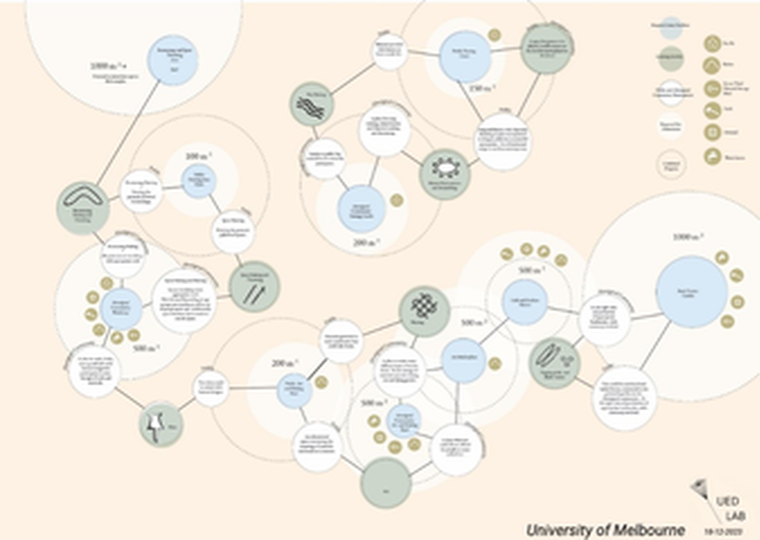THE/03
Climate Adaptation Strategies for
Merri-Bek Council: Landscape Architecture & Resiliency on Country
Alexander J. Felson

Studio Description
This studio centres on enhancing climate adaptation and resilience for the Merri-Bek Council, currently in the final stages of its ten-year Open Space Strategy (OSS) update (Feedback accepted until 20 February, 2024). The OSS conducts spatial analysis, assessing green space proximity and park quality to pinpoint gaps. Collaborating with the Natural Resource Management, Sustainable Built Environment, and Property teams, the aim is to identify priority properties for an equitable park network, aligning with the 2020 Nature Plan.
In the initial stage, we'll engage with these teams to extend the OSS, crafting a long-term Climate Adaptation Strategy (2050, 2100) for Merri-Bek. Emphasizing water-sensitive urban design, urban heat, biodiversity, and community spaces, we'll integrate insights from the 2022 Climate Risk Strategy, the Nature Plan, and our own proposals for future Merri-Bek amidst population and housing growth.
Transitioning from broad Council planning, the focus narrows to site design, particularly Ballerrt Mooroop in the northwest corner of Glenroy. The client (Rights Holders), Wurundjeri Woi-wurrung Cultural Heritage Aboriginal Corporation, collaborates with the Merri-Bek Council and local Indigenous Working Group. The brief involves developing landscape architectural approaches, integrating WSUD, biodiversity, microclimate benefits, and community investment. Students will approach projects through cultural, ecological, infrastructural, and land use lenses, contributing to the activation of Ballerrt Mooroop as an Indigenous Community Hub on behalf of Rights Holders and the Merri-Bek Council.
Studio Outcomes
The course is organised into three stages with associated assignments. The first stage focuses on an in-depth site analysis and understanding of the planning documents and strategies for Merri-bek Council. Students will develop mapping and conceptual thinking based on Stakeholder feedback and analysis. They will generate site analysis drawings that connect Country to Site and that explore past, present and future. The second phase will focus on strategic adaptation planning as part of a shared Climate Adaptation Strategy Merri-bek Council. Phase 3 will include developing detailed designs for two areas that connect the broader planning efforts to the Ballerrt Mooroop site. Stakeholder meetings and a field trip will provide opportunities to consider the site through an environmental, social, and economic lens to inform adaptation and resilience.
Over the course of the semester, students will be exposed to experts and to planning processes and documents. They will hear from the Client (Rights Holders) and develop carefully situated landscape architecture adaptations. Students will work through weekly design exercises based on WSUD, biodiversity, community place making and other critical notions of sustainability.
Studio Leaders
Professor Alex Felson, the Elisabeth Murdoch Chair of Landscape Architecture at ABP, is dedicated to advancing resilient and sustainable cities through his work as an academic and practitioner. At UoM, he integrates design, engineering, and ecosystem sciences, specializing in urban ecological experiments for functional and aesthetic urban design. Focused on climate adaptation, he addresses water-sensitive urban design, biodiversity, and ecosystem functioning.
As the director of the Urban Ecology and Design Lab (UEDLAB), Felson merges applied urban ecology with landscape architecture, emphasizing climate adaptation, green infrastructure, and engineered ecosystems. The UEDLAB focuses on regional-scale climate adaptation planning, site-specific landscape ecological design, and engineering ecosystems at the intersection of ecology, building, infrastructure, and people.
Felson's career journey began in forestry and botany before transitioning to landscape architecture. He gained extensive experience in New York City, contributing to community projects, including a Harlem community garden and the Reforestation Plan (MillionTreesNYC). His Ph.D. focused on amphibians and suburbanization, integrating research into projects to inform housing, infrastructure, and road alignments.
Currently, Felson collaborates with FEIT and SAFES in Melbourne to establish the Water Security and Resilience Living Lab at Fishermans Bend. His team, awarded the Fishermans Bend Innovation Challenge, constructed a bioretention garden using recycled waste materials. Additionally, they work with UoM Biosciences on food web design in Royal Park and co-teach Design with Country Studio with elders from the Wurunderji Woi-wurrung.
Readings & References
Readings and references will be discussed on a project-by-project basis.
Schedule:
Wednesday 10-11 AM Lectures and 14:00-17:00 Studio
Thursdays 12:00-15:00 Studio
Off-Site Activities:
3 stakeholder meetings at Merri-bek Council and a site visit/Walk on Country